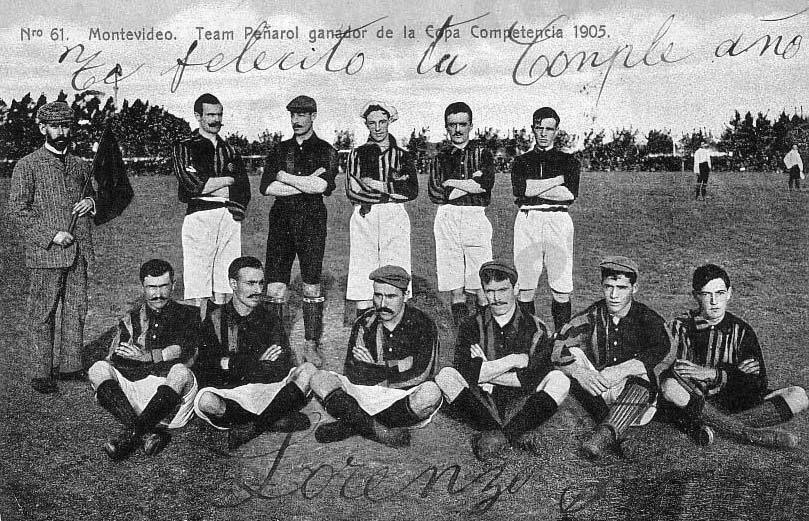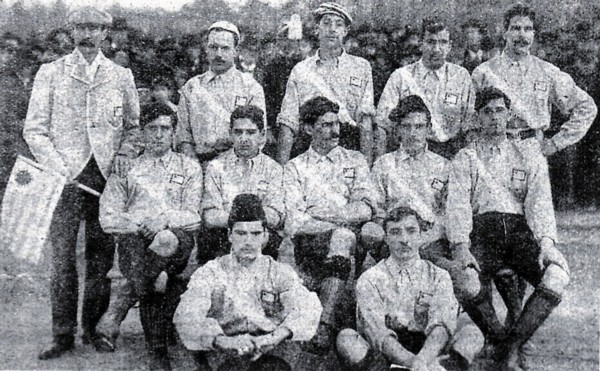|
Walter Olivera
Walter Daniel Olivera Prada (born 16 August 1952) is a Uruguayan footballer. He played in ten matches for the Uruguay national football team from 1973 to 1983. He was also part of Uruguay's squad for the 1975 Copa América The 1975 edition of the Copa América football tournament was played between 17 July and 28 October. For the first time there was no fixed venue, and all matches were played throughout the year in each country. In addition, the tournament changed ... tournament. References External links * 1952 births Living people Uruguayan men's footballers Uruguay men's international footballers Place of birth missing (living people) Men's association football defenders Peñarol players Copa Libertadores-winning players Clube Atlético Mineiro players Uruguayan expatriate men's footballers Expatriate men's footballers in Brazil Uruguayan football managers Peñarol managers Rampla Juniors managers {{Uruguay-footy-defender-1950s-stub ... [...More Info...] [...Related Items...] OR: [Wikipedia] [Google] [Baidu] |
Defender (association Football)
In the sport of association football, a defender is an outfield position whose primary role is to stop attacks during the game and prevent the opposition from scoring. Centre-backs are usually positioned in pairs, with one full-back on either side to their left and right, but can be played in threes with or without full-backs. Defenders fall into four main categories: centre-back, sweeper, full-back, and wing-back. The centre-back and full-back positions are essential in most modern formations. The sweeper and wing-back roles are more specialised for certain formations dependent on the manager's style of play and tactics. Centre-backs are usually tall and positioned for their ability to win duels in the air. Centre-back The centre-back (also known as a central defender or centre-half, as the modern role of the centre-back arose from the centre-half position) defends in the area directly in front of the goal and tries to prevent opposing players, particularly centre-forwa ... [...More Info...] [...Related Items...] OR: [Wikipedia] [Google] [Baidu] |
Uruguayan Football Managers
Uruguay (; ), officially the Oriental Republic of Uruguay ( es, República Oriental del Uruguay), is a country in South America. It shares borders with Argentina to its west and southwest and Brazil to its north and northeast; while bordering the Río de la Plata to the south and the Atlantic Ocean to the southeast. It is part of the Southern Cone region of South America. Uruguay covers an area of approximately and has a population of an estimated 3.4 million, of whom around 2 million live in the metropolitan area of its capital and largest city, Montevideo. The area that became Uruguay was first inhabited by groups of hunter–gatherers 13,000 years ago. The predominant tribe at the moment of the arrival of Europeans was the Charrúa people, when the Portuguese first established Colónia do Sacramento in 1680; Uruguay was colonized by Europeans late relative to neighboring countries. The Spanish founded Montevideo as a military stronghold in the early 18th century ... [...More Info...] [...Related Items...] OR: [Wikipedia] [Google] [Baidu] |
Expatriate Men's Footballers In Brazil
An expatriate (often shortened to expat) is a person who resides outside their native country. In common usage, the term often refers to educated professionals, skilled workers, or artists taking positions outside their home country, either independently or sent abroad by their employers. However, the term 'expatriate' is also used for retirees and others who have chosen to live outside their native country. Historically, it has also referred to exiles. Expatriates are immigrants or emigrants who maintain cultural ties such as the language of their country of origin. Etymology The word ''expatriate'' comes from the Latin terms '' ex'' ("out of") and '' patria'' ("native country, fatherland"). Semantics Dictionary definitions for the current meaning of the word include: :Expatriate: :* 'A person who lives outside their native country' (Oxford), or :* 'living in a foreign land' (Webster's). These definitions contrast with those of other words with a similar meaning, such ... [...More Info...] [...Related Items...] OR: [Wikipedia] [Google] [Baidu] |
Uruguayan Expatriate Men's Footballers
Uruguay (; ), officially the Oriental Republic of Uruguay ( es, República Oriental del Uruguay), is a country in South America. It shares borders with Argentina to its west and southwest and Brazil to its north and northeast; while bordering the Río de la Plata to the south and the Atlantic Ocean to the southeast. It is part of the Southern Cone region of South America. Uruguay covers an area of approximately and has a population of an estimated 3.4 million, of whom around 2 million live in the metropolitan area of its capital and largest city, Montevideo. The area that became Uruguay was first inhabited by groups of hunter–gatherers 13,000 years ago. The predominant tribe at the moment of the arrival of Europeans was the Charrúa people, when the Portuguese first established Colónia do Sacramento in 1680; Uruguay was colonized by Europeans late relative to neighboring countries. The Spanish founded Montevideo as a military stronghold in the early 18th century be ... [...More Info...] [...Related Items...] OR: [Wikipedia] [Google] [Baidu] |
Copa Libertadores-winning Players
Copa or COPA may refer to: COPA COPA may refer to: * Computer Operator Programming Assistant. trade of ITI * Child Online Protection Act, a former U.S. law to protect minors from certain material on the internet * Canadian Owners and Pilots Association * Cirrus Owners and Pilots Association * Parliamentary Conference of the Americas * COPA (gene), a human gene that encodes the coatomer subunit alpha protein * Controlling Profitability Analysis, Profitability Analysis (SAP) *COPA-COGECA, a union of European farmers Copa Copa may refer to: * Copa Heizung GmbH, COPA branded hydronic steel panel and bathroom radiator supplier based in Germany * Copa Airlines, an international airline based in Panama * Copa America, the main association football competition of the South American men's national football teams * ''Copa'' (spider), a genus of spiders in the family Corinnidae * Copacabana (nightclub), a nightclub in New York City * Copa Room, now-defunct Las Vegas nightclub at The San ... [...More Info...] [...Related Items...] OR: [Wikipedia] [Google] [Baidu] |
Peñarol Players
Club Atlético Peñarol (; English: ''Peñarol Athletic Club'') —also known as ''Carboneros'', ''Aurinegros,'' and (familiarly) ''Manyas''— is a Uruguayan sports club from Montevideo. The name "Peñarol" comes from the Peñarol neighbourhood on the outskirts of Montevideo. Throughout its history the club has also participated in other sports, such as basketball and cycling. Its focus has always been on football, a sport in which the club excels, having never been relegated from the top division. In international competition, Peñarol is the third-highest Copa Libertadores winner with five victories and shares the record for Intercontinental Cup victories with three. In September 2009, the club was chosen as the South American Club of the Century by the IFFHS . Apart from men's football, other active sports sections of Peñarol are rugby union, futsal, women's football, and athletics. History Origins On September 28, 1891, employees of the Central Uruguay Ra ... [...More Info...] [...Related Items...] OR: [Wikipedia] [Google] [Baidu] |
Place Of Birth Missing (living People)
Place may refer to: Geography * Place (United States Census Bureau), defined as any concentration of population ** Census-designated place, a populated area lacking its own municipal government * "Place", a type of street or road name ** Often implies a dead end (street) or cul-de-sac * Place, based on the Cornish word "plas" meaning mansion * Place, a populated place, an area of human settlement ** Incorporated place (see municipal corporation), a populated area with its own municipal government * Location (geography), an area with definite or indefinite boundaries or a portion of space which has a name in an area Placenames * Placé, a commune in Pays de la Loire, Paris, France * Plače, a small settlement in Slovenia * Place (Mysia), a town of ancient Mysia, Anatolia, now in Turkey * Place, New Hampshire, a location in the United States * Place House, a 16th-century mansion largely remodelled in the 19th century, in Fowey, Cornwall * Place House, a 19th-century man ... [...More Info...] [...Related Items...] OR: [Wikipedia] [Google] [Baidu] |
Uruguay National Football Team
The Uruguay national football team ( es, Selección de fútbol de Uruguay) represents Uruguay in international football, and is controlled by the Uruguayan Football Association, the governing body for football in Uruguay. The Uruguayan team is commonly referred to as ''La Celeste'' (The Sky Blue). Regarded to be one of the greatest footballing nations of all time, Uruguay has won the Copa América 15 times being tied with Argentina for the most titles in the history of the tournament. Uruguay won their most recent title in 2011. Additionally, Uruguay are the holders of four FIFA World Championships: The team has won the FIFA World Cup twice, including the first World Cup in 1930 as hosts, defeating Argentina 4–2 in the final. Their second title came in 1950, upsetting host Brazil 2–1 in the final match, which had the highest attendance for a football match ever. Uruguay has also won gold medals at the Olympic football tournament twice, in 1924 and 1928. The gold medal ... [...More Info...] [...Related Items...] OR: [Wikipedia] [Google] [Baidu] |
Uruguay Men's International Footballers
Uruguay (; ), officially the Oriental Republic of Uruguay ( es, República Oriental del Uruguay), is a country in South America. It shares borders with Argentina to its west and southwest and Brazil to its north and northeast; while bordering the Río de la Plata to the south and the Atlantic Ocean to the southeast. It is part of the Southern Cone region of South America. Uruguay covers an area of approximately and has a population of an estimated 3.4 million, of whom around 2 million live in the metropolitan area of its capital and largest city, Montevideo. The area that became Uruguay was first inhabited by groups of hunter–gatherers 13,000 years ago. The predominant tribe at the moment of the arrival of Europeans was the Charrúa people, when the Portuguese first established Colónia do Sacramento in 1680; Uruguay was colonized by Europeans late relative to neighboring countries. The Spanish founded Montevideo as a military stronghold in the early 18th century ... [...More Info...] [...Related Items...] OR: [Wikipedia] [Google] [Baidu] |
Uruguayan Men's Footballers
Uruguay (; ), officially the Oriental Republic of Uruguay ( es, República Oriental del Uruguay), is a country in South America. It shares borders with Argentina to its west and southwest and Brazil to its north and northeast; while bordering the Río de la Plata to the south and the Atlantic Ocean to the southeast. It is part of the Southern Cone region of South America. Uruguay covers an area of approximately and has a population of an estimated 3.4 million, of whom around 2 million live in the metropolitan area of its capital and largest city, Montevideo. The area that became Uruguay was first inhabited by groups of hunter–gatherers 13,000 years ago. The predominant tribe at the moment of the arrival of Europeans was the Charrúa people, when the Portuguese first established Colónia do Sacramento in 1680; Uruguay was colonized by Europeans late relative to neighboring countries. The Spanish founded Montevideo as a military stronghold in the early 18th century ... [...More Info...] [...Related Items...] OR: [Wikipedia] [Google] [Baidu] |


